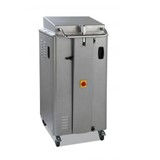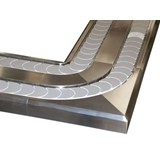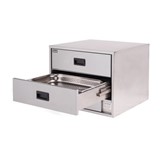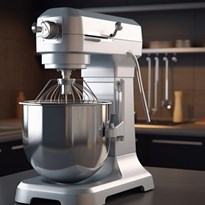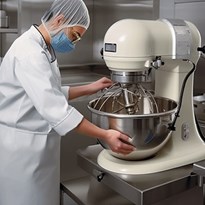If you're running a bakery, restaurant, or any food service business that requires consistent and high-volume mixing of dough, batter, or other ingredients, a commercial planetary mixer is an essential piece of equipment to have. With the right mixer, you can save time, increase productivity, and produce high-quality products.
But with so many different models and features available, choosing the right mixer can be a daunting task. That's why we've put together this comprehensive buying guide to help you make an informed decision. We've covered everything from the different types of mixers to the key features you should consider, including capacity, motor power, speed settings, construction, transmission, control panel, mixing bowl, safety features, and accessories.
3 Main Types of Commercial Mixers
There are three main types of commercial mixers: planetary mixers, spiral mixers, and fork mixers. Each type has its advantages and disadvantages, depending on your specific needs.
1. Planetary Mixers
Planetary mixers are the most popular type of mixer in the market, thanks to their versatility and efficiency. They feature a bowl that rotates on an axis while the agitator (mixing attachment) moves around the bowl. This dual motion creates a planetary-like motion, hence the name. Planetary mixers are ideal for mixing dough, batter, cream, and other ingredients. They come in various sizes, from small countertop models to large floor-standing models. Planetary mixers are suitable for small to medium-sized businesses and can mix a wide range of ingredients.
2. Spiral Mixers
Spiral mixers are popular in bakeries and pizza shops, thanks to their ability to mix large quantities of dough quickly and efficiently. They feature a spiral-shaped agitator that rotates while the bowl remains stationary. The spiral motion mimics the traditional hand-kneading motion, resulting in a more consistent and uniform mix. Spiral mixers are available in both countertop and floor-standing models. They are suitable for businesses that require large quantities of dough and need to mix them quickly and efficiently.
3. Fork Mixers
Fork mixers are less common than planetary and spiral mixers, but they're popular in European-style bakeries. They feature two or three fork-shaped agitators that rotate while the bowl remains stationary. The forks gently mix and knead the dough, resulting in a softer and more uniform mix. Fork mixers are usually more expensive than other types of mixers and are suitable for businesses that require a softer and more uniform mix of dough.
This guide will provide an overview of the factors to consider when choosing the right planetary mixer to buy. To make an informed decision, there are several important factors that need to be taken into account.
9 Key Features to Consider When Purchasing the Planetary Mixer
When choosing a commercial mixer, there are several key features you should consider to ensure that you choose the right one for your business.
1. Capacity
The capacity of the mixer refers to the volume of the bowl and the maximum amount of dough or batter that it can handle. Mixers come in a range of sizes, from 5 quarts to 140 quarts. Choose a mixer with a capacity that matches the volume of ingredients that you typically mix. A larger mixer may be more expensive, but it can save you time and increase your production capacity in the long run.
2. Motor Power
The motor power of the mixer determines its performance and ability to handle heavy loads. Look for a mixer with a powerful motor that can handle the volume and viscosity of the ingredients you'll be mixing. A higher horsepower (HP) rating indicates a more powerful motor. A powerful motor can help reduce mixing time and ensure that the mixer can handle heavy loads.
3. Speed Settings
Most mixers come with variable speed settings, which allow you to control the speed of the mixing process. Look for a mixer with at least three-speed settings, including a low speed for gentle mixing and a high speed for faster mixing. Different speeds are suitable for different types of ingredients, so having multiple speed settings can help you achieve the desired mix.
4. Construction and Durability
Choose a mixer that is made of high-quality materials such as stainless steel, which is durable and easy to clean. Also, check the thickness of the bowl and the construction of the agitator to ensure that they are sturdy and can withstand heavy use. A mixer that is well-constructed and durable can save you money in the long run by reducing repair and replacement costs.
5. Transmission
The transmission system of a commercial planetary mixer is responsible for transferring power from the motor to the mixing bowl. There are two types of transmission systems: belt-driven and gear-driven.
- Belt-Driven System
Belt-driven systems are typically found in smaller, countertop models. They use a belt to transfer power from the motor to the mixing bowl. This system offers more speed options and flexibility, making it ideal for mixing a variety of ingredients. However, belt-driven systems are not meant for continuous, heavy-duty tasks. Overuse can wear out the belt, leading to decreased performance and efficiency. Repairs for belt-driven systems are typically less expensive than gear-driven systems. Belt-driven models are also quieter than gear-driven models.
- Gear-Driven System
Gear-driven systems are found in larger, heavy-duty machines like floor models. They use a system of gears to transfer power from the motor to the mixing bowl. This system offers fewer speed choices but has consistent speed regardless of the ingredient density, making it ideal for handling dense and heavy ingredients. Gear-driven models require less maintenance than belt-driven models. However, they may require more maintenance than belt-driven models. Repairs for gear-driven systems are typically more expensive than belt-driven systems.
6. Control Panel
The control panel of a commercial planetary mixer contains speed and timer functions. The speed control allows the user to adjust the mixer's speed to the desired level. Belt-driven models offer more speed options and adjustable speeds during operation, while gear-driven models offer fewer speed choices but have consistent speed regardless of the ingredient density. Timers are common in both types, with many manufacturers offering 30-60 minute timers and recall settings. The timer function allows the user to set a specific time for the mixer to run. Once the timer has expired, the mixer will automatically shut off. This feature is helpful for ensuring consistency in recipes and preventing overmixing.
7. Mixing Bowl
Using the correct size mixing bowl is crucial for effective mixing. Too small a bowl will cause ingredients to spill out, while too large a bowl will not mix ingredients properly. Commercial mixers should have stable bottoms and sturdy legs, with rubber bottoms and feet for safety. Mixers with a capacity of 10 lbs. or more typically feature a bowl lift that can be operated manually or electronically, eliminating the need for heavy lifting. These mixers use arms to attach to the sides of the mixing bowl, raising it to the agitator and lowering it when mixing is complete. Some bowl lifts swing out to the side to facilitate the addition or removal of ingredients. Manufacturers have turned bowl lifts into safety features, ensuring that if the mixing bowl is not properly raised, the mixer will not turn on.
8. Safety Features
Safety is an important consideration when choosing a commercial planetary mixer. Stable bottoms and sturdy legs are must-haves for all appliances in a commercial kitchen. Safety guards are also essential, preventing miscellaneous items from entering the mixing bowl. Commercial Planetary Mixers should have emergency mechanisms that shut down the machine if, for instance, the bowl is out of place. Splash guards prevent ingredients from spilling out of the bowl and onto the counter and machine operator. A sturdy, well-designed mixer is essential for preventing accidents and injuries in the kitchen.
9. Accessories
Options and attachments add versatility to commercial mixers. The most basic accessories needed for operation include whisks, dough hooks, and beaters.
The range of attachments and accessories that a mixer can be used with makes it a versatile tool for a wide range of food preparation tasks. Here are some of the most common agitator attachments:
- Flat Beater: This attachment is perfect for making cake batters, cookie doughs, mashed potatoes, and other light to medium mixtures. It can also be used to incorporate solids such as nuts, dried fruits, and chocolate chips into the batter.
- Wire Whip: Also known as a balloon whip or cage whip, this attachment is used to incorporate air into eggs, egg whites, creams, and other mixtures at high speeds. It is ideal for making meringues, frostings, and whipped creams.
- Dough Hook: This attachment is C-shaped, J-shaped, or spiral-shaped and is best used at low speeds for working ingredients in heavy doughs. Spiral-shaped dough hooks are more common, but C-shaped and J-shaped hooks are sometimes preferred because their shape allows them to add ingredients more gently than spiral-shaped hooks.
- Pastry Knife: This attachment is used for blending butter, shortening, and other fats into flour for making flaky pastry and pie crusts. The pastry knife is best used at low speeds to prevent overworking the gluten.
- Wing Whip: Similar to a wire whip, this attachment has sturdier frames that allow it to aerate heavier mixtures such as mayonnaise and mashed potatoes.
High-end models also feature attachment hubs that allow them to perform tasks beyond the usual mixing, beating, and kneading. These attachments include a meat grinder, sausage stuffer, vegetable shredder, strainer, grain mill, juicer, pasta roller, and ravioli maker, among others.
Benefits of Owning a Commercial Planetary Mixer or Bakery Mixer
A commercial planetary mixer or bakery mixer is an essential piece of equipment in any commercial kitchen. Whether you're running a bakery, restaurant, or catering business, having a high-quality mixer can make all the difference in your production efficiency and product quality. Here are some of the key benefits of owning a commercial mixer.
-
Versatility
One of the most significant benefits of owning a commercial planetary mixer or bakery mixer is the versatility it offers. With the ability to mix a wide range of ingredients, including doughs, batters, and sauces, a commercial mixer can handle virtually any mixing task you throw at it. The versatility of a mixer makes it an essential tool in any commercial kitchen, providing you with the flexibility to create a wide range of dishes and products.
-
Time-Saving
Time is a valuable commodity in any commercial kitchen, and owning a commercial mixer can help you save a significant amount of it. Mixing ingredients by hand can be time-consuming and physically demanding, especially when dealing with large batches. Commercial Planetary Mixer takes care of the mixing process quickly and efficiently, allowing you to focus on other tasks. This increased efficiency can help you produce more products in less time, increasing your production capacity and profitability.
-
Consistency
Consistency is critical in any commercial kitchen. Customers expect their food to taste the same every time they order it, and a commercial mixer can help you achieve that consistency. By providing a uniform mix every time, a mixer ensures that your products will taste the same every time they are made. This consistency helps build customer loyalty and ensures that your customers keep coming back for more.
-
Quality
The quality of your products is essential to your success in the food service industry. A commercial mixer can help you achieve the highest level of quality by ensuring that all of your ingredients are thoroughly mixed. Proper mixing ensures that all of the ingredients are evenly distributed, resulting in a better texture and taste. With a commercial mixer, you can produce high-quality products consistently, which can help build your reputation as a reliable and quality-driven business.
-
Customization
Another benefit of owning a commercial mixer is the ability to customize your products to meet your customers' needs. By adjusting the mixing speed and time, you can create unique recipes that are tailored to your customer's preferences. This customization can set you apart from your competitors and give you a competitive edge in the market.
-
Durability
Commercial mixers are designed to withstand the rigours of a commercial kitchen. They are built to last and are made with high-quality materials that can withstand frequent use. With proper maintenance, a commercial mixer can last for years, making it a sound investment for your business.
In conclusion, a commercial planetary mixer or bakery mixer is a valuable investment for any food service business that requires consistent and high-volume mixing of dough, batter, or other ingredients. By choosing the right type of mixer and considering key features such as capacity, motor power, speed settings, construction and durability, transmission, control panel, mixing bowl, safety features, and accessories, you can ensure that you select the best mixer for your specific needs. The benefits of owning a commercial mixer are numerous, including versatility, time-saving, consistency, quality, customization, efficiency, and durability. With a commercial mixer in your kitchen, you can increase your productivity, produce high-quality products, and set your business apart from competitors. So invest in the right mixer today and take your food service business to the next level!

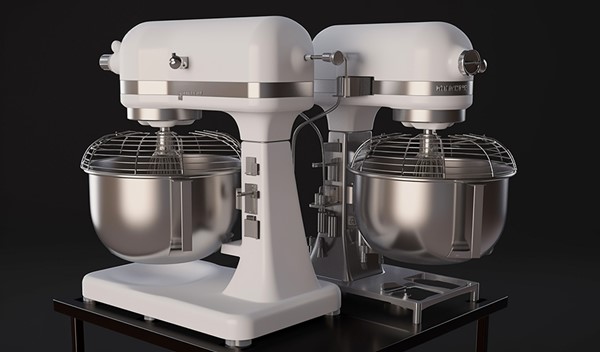
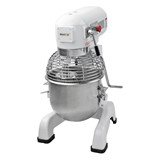
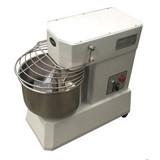

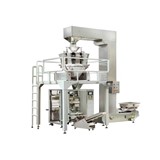
-160x160-state_article-rel-cat.png)




-160x160-state_article-rel-cat.png)




